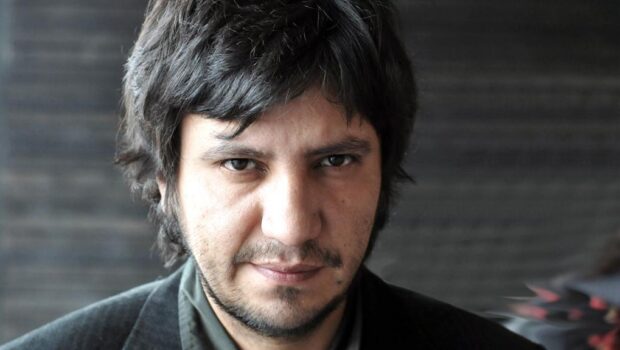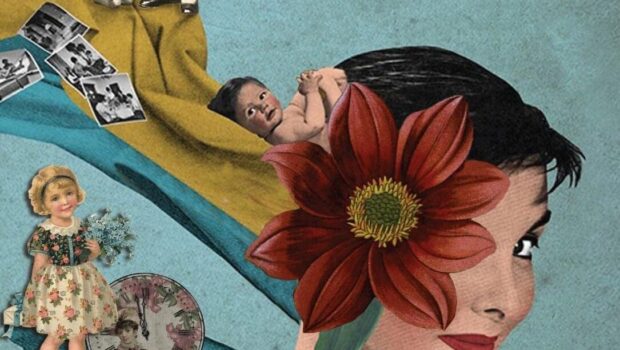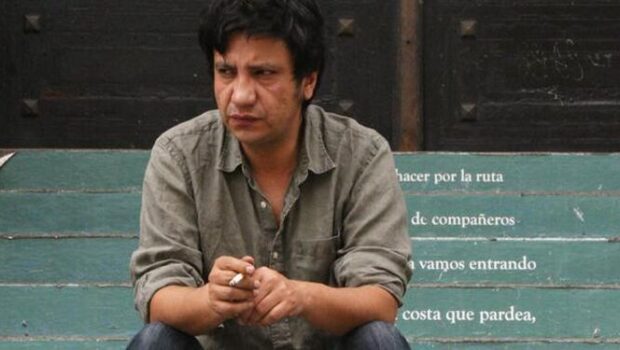Everything I will not read
Lo que no leeré
Adriana Díaz Enciso
For some months now, I’ve been feeling a certain urgency to read again Thomas Mann’s Doctor Faustus. It would be the third time. Some fifteen years elapsed between my first reading of the Spanish translation and the second one, in the English version. To reread it now would result in a neat time balance. What stops me is the ever higher pile of books waiting to be read on my desk and in my bookshelves, the long list of those that I want to read though I still don’t have them or I must consult in some library, and at the back, but not so deeply buried that it won’t make itself heard, the list of all the other books already read to which, along with Doctor Faustus, I’d also like to go back.
When I was a child, the outlandish ambition to read all the books that exist once crossed my mind. As you may see, it was more of a quantitative than a qualitative greed; I didn’t stop to think then on quality control, but the feat itself didn’t seem to me all that preposterous. Sure enough, very soon I became aware of its impossibility, and yet, until a few years ago, the journey of reading still seemed to me to be infinite, devoid of borders.
I don’t know exactly when not only the idea, but the conviction that life won´t be long enough to read—and reread—all the books that I want, nor all those wonderful ones whose existence I haven’t discovered yet, including those that are being written right now in diverse corners of the world, made its way insidiously in my mind; the certainty that the adventure of reading, which has been to a great extent the centre and way of my life, is not, in the long run, endless; that for decades I had been mistaking the immortality of literature for mine own, without truly acknowledging what I already knew in theory: that mine is an impossibility. (Even literature’s is, if we take this chain of ideas to its extreme, in the knowledge that not even our planet, or our sun, will be forever, but let us leave these excesses of exactness for another moment). It seems that, somehow, I have spent my life holding on to books as a confirmation of eternity—an eternity in which they and I were together—and to suddenly realize that that is not the case, that there will be books left in my bookshelves when I’m no longer here, the pages of which my eyes will have never touched, fills me with unutterable melancholy.
The tragedy is universal, or as universal as anything pertaining to the percentage of the population that cares about books can be, and it doesn’t forgive even great authors (who are, by necessity, great readers), who die without having read a great deal of what exists in their own time, and absolutely nothing of what will exist thereafter. Don’t you find it sad, for instance, that Cervantes never read Laurence Sterne? Nor Lewis Carroll James Joyce. Et cetera. Think of the infinite possibilities of affinity, complicity, and delight that death has dashed.
To tell the truth, though accepting this sad reality has been a quiet and circumspect process, I’m not sure I have found consolation. Not to be accompanied ever again by the millions of pages that have largely forged my life? How can that be, when I still remember, with the clarity with which you experiment the present, what streets I was walking by, in which parks, in which cafés I found shelter while I was reading this or that book, and how the experience of reading it was the fundamental counterpoint to that unique moment of my life, opening doors to other universes, establishing bonds with the books I’d read afterwards and, no doubt, with those I would write myself. And the books from childhood! Never, never more, as Poe’s raven quotes, a poem that I reread recently for a course I was teaching and which I enjoyed, if that’s possible, even more than on previous occasions, though without knowing if there will be a next time. Never more, the thick volume of the One Thousand and One Nights, with its azure hard cover and exquisite watercolour illustrations that my godmother gave me when I turned nine or ten years old, the whereabouts of which only God knows, if it still exists at all, nor the delight of Tove Jansson’s Finn Family Moomintroll, which as a child, when the whole of time seemed to be ahead of me and truly infinite, I indulged myself to reading over and over until I knew it by heart. Never more, the probably mediocre crime novels I found in the family’s bookcase, which, however, suggested to my imagination the utterly mysterious possibility of the existence of other worlds, other realities, and that was enough for me, nor Bruguera’s anthologies of ghost stories, or that cheap edition of Saki’s with the garish cover.
Won’t I ever read Dickens’ novels again? Or Virginia Woolf, the reading of whose work made me realize, when I was sixteen, that all I wanted in this life was to be a writer, nothing more? How many more times will I be able to read Octavio Paz’s poems, or Villaurrutia’s or César Vallejo’s? Rimbaud, Nerval? And is it really possible that I may not get to read all those books which I know, through the reference of other books, friends and critics, that I will enjoy immensely? Won’t I ever go back to all those mystics from different traditions, nor to those who inquire into the invisible, who made me understand that writing is transcendent stuff, a bridge—even if imperfectly human—to the essence of reality? And won’t I read Hildegard von Bingen’s complete works, or finish reading Giordano Bruno’s? And all those novels and books of poetry and two or three of philosophy that wobble on that ever-higher column of works to read urgently…. You must have seen by now that the lamentation is endless, and I could fill with it hundreds, perhaps thousands of pages: the book of the lament of the books that won´t be for us, no matter how hard we try to tell ourselves otherwise. As for what I have already read, I clarify that not only do I lament the high probability of not having time to go back to the contents of most of those books, but also the resounding impossibility to do it in the very copies where I read them for the first time.
Many years ago, during a visit to Mexico, when I realized that I couldn’t leave indefinitely my untouched library gathering dust in a basement, that I couldn’t bring it to London, and that everything seemed to suggest I wasn’t going back, I made the necessary and terrible decision to sell it, keeping just a few essential volumes. Very soon, back in London, I gathered again loads of books; I even bought again some of those I had sold, but nothing has ever filled the void left by such an act of self-dispossession dictated by necessity, and even now, when I look at my bookshelves, I miss the old books that formed me and which I definitely will never read again.
You will tell me that consolation is to be found in what books leave inside us; in what they are already in our memory, with deep and indelible roots; in the way they have nurtured, from childhood, the human being I am now. And you will be right, without a doubt. But I lack the wisdom of Milarepa, who burnt all the books of his disciple Rechungpa, barely saving a few folios, as a warning against attachment to them, and who thought that the whole world and everything in it is the book where you learn about death, impermanence, the ultimate emptiness of all reality. I am far, too far from having such sound judgement, courage, and equanimity, though it is true that selling my library in Mexico, painful as it was, taught me something about the value of detachment from what we believe to be inseparable from us. But the lesson must have been cut short: I do know that everything I’ve read is within me and is part of me, even those pages I have forgotten, but what I want is to go back to all those books, to the physical experience of seeing them, feeling their weight in my hands, smelling their paper and ink; to be again a conscious inhabitant of the unique universe created by their authors and, while I’m at it, to read absolutely everything I still need to read. You will have noticed by now that this yearning goes hand in hand with our urge to cling to life; with the Proustian memory of instants already gone evoked by a random sensory experience (and sure enough, we needed a book to indelibly register that experience. A book that, to top it all, the horror of it!, I haven’t read yet); the longing that moves us deeply when we see the reflection of the trees on the wet pavement after the rain on a particular afternoon. The curious thing is that it is easier for me (it’s only a manner of speaking) to understand that my experiences in this world will cease one day than accepting that, when that moment comes, I will leave all those unread (or un-reread) books behind. Isn’t literature a vehicle of limitless human communication? Isn’t it a web of individual, unique universes paradoxically shared, that breaks all barriers, whether geographical, generational, historic, or temporal, always waiting patiently for chance, or instruction and study to lead us to them?
Which is another way of saying, if the absence of limits is true, that literature builds indestructible bridges between life and death. And then? How do we resolve the atrocious contradiction of knowing that death will snatch away from us, among the total of our experience in and of this world, the access to a universe that we conceive as inexhaustible? A universe, furthermore, created in spite of human fragility, or rather—and this is another paradox—because of it, in defiance of the gods who try to put an end to our destiny.
I have been pondering on these things of late, and my visits to bookshops contain an element of caution that, until recently, was unknown to me. I often restrain myself before the temptation of numerous volumes that stir my curiosity and my desire, and my consideration doesn’t have that much to do with the economy of money as with that of time. My time, the time of my life; the need to choose carefully on which pages to sail during the time still allotted to me, which, however long it may be (I want to believe that), at this stage it is definitively less than it was. At moments, however, recklessness triumphs again and I get another book, and another one, which are then added up to the tower of worlds to be discovered whose precarious equilibrium I watch with growing apprehension.
Not long ago I was walking down the street, looking at the circles of light that the summer sun projected over the pavement as it went through the trees’ dense foliage. I told B about it, and he reminded me of that passage in Joyce’s Ulysses in which the sun “flung spangles, dancing coins” “through the checkerwork of leaves” on Mr. Deasy’s (with irony) “wise shoulders”. B and I have been reading Finnegans Wake for several months now. It’s my first time, though not for him. I often think of the strange but unquestionable eternity conferred to Joyce (or rather, that he conferred to himself through his writing), and I don’t mean only those books which constitute his immortal (in a human measure) body of work, but something that is still—at least in my imagination—Joyce the man who was once alive, flesh and blood. Surely, I tell myself, somehow he’s witness of the enormous pleasure, and no smaller consternation and efforts of all those who keep on reading him and those who toil away trying to decipher his texts, generating in the process another infinity of books, most of which I fear will also remain unread by me. We usually read FW at noon, in one of the small parks in Bloomsbury and the Kings Cross area. Around a month ago we were sitting at the tiny Percy Circus. (Lenin lived there for a short while. He’d have been close to the British Library, then housed in the British Museum, which he visited every time he passed through London. I imagine that most, if not all, of the books he consulted there belong with those that I’ll never read.) We were silent, after having read some pages of Joyce´s most astounding work, allowing their effect to sink in, when we saw again those sun-coins on the ground winking at us through the foliage´s shadows. I thought then that it was extraordinary to know that the living James Joyce had seen that humble phenomenon once (or surely many times), that he had considered it worthy of record, transfigured in that scene in the Ulysses, and even more extraordinary that we were reading Joyce that day, witnessing the same manifestation of light playing with the trees’ boughs and their stirred shadows. I thought that Joyce was necessarily alive because of the simple fact that we, alive as far as we know, were recognizing his experience; that the same kind of immortality then was also bestowed to his readers, and though there’s no way to prove this scientifically, somehow we’re certain that that web with infinite ramifications will never be torn for as long as there are human readers walking on this earth.
These fleeting illuminations bring a good dose of relief and reconciliation with my fate, even if the problem of all those books I will never read persists. Meanwhile, I can see the scales tipping, and I think I will reread Doctor Faustus after all. Soon, I hope.
*Foto de Mari Potter en Unsplash

Adriana Díaz-Enciso es poeta, narradora y traductora. Ha publicado las novelas La sed, Puente del cielo, Odio y Ciudad doliente de Dios, inspirada en los Poemas proféticos de William Blake; los libros de relatos Cuentos de fantasmas y otras mentiras y Con tu corazón y otros cuentos, y seis libros de poesía. Su más reciente publicación, Flint (una elegía y diario de sueños, escrita en inglés) puede encontrarse aquí.
©Literal Publishing. Queda prohibida la reproducción total o parcial de esta publicación. Toda forma de utilización no autorizada será perseguida con lo establecido en la ley federal del derecho de autor.
Las opiniones expresadas por nuestros colaboradores y columnistas son responsabilidad de sus autores y no reflejan necesariamente los puntos de vista de esta revista ni de sus editores, aunque sí refrendamos y respaldamos su derecho a expresarlas en toda su pluralidad. / Our contributors and columnists are solely responsible for the opinions expressed here, which do not necessarily reflect the point of view of this magazine or its editors. However, we do reaffirm and support their right to voice said opinions with full plurality.
Hace meses que experimento cierta urgencia de volver a leer Doctor Faustus, de Thomas Mann. Sería la tercera vez. Entre mi primera lectura de la traducción al español y la segunda, en la versión inglesa, mediaron unos 15 años. Releerla ahora resultaría en un proporcionado equilibrio temporal. Lo que me detiene es la cada vez más alta pila de libros que esperan ser leídos en mi escritorio y mis libreros, la larga lista de los que quiero leer aunque aún no los tenga o que debo consultar en alguna biblioteca, y al fondo, pero no tan sepultada que no se haga oír, la lista de todos los otros libros ya leídos a los que, junto al Doctor Faustus, también quisiera volver.
Cuando era niña me cruzó por la cabeza una vez la peregrina ambición de leer todos los libros que existen. Era, como podrá verse, una avidez más cuantitativa que cualitativa; no me detuve a pensar entonces en el control de calidad, pero la hazaña en sí no me parecía descabellada. Claro está que muy pronto fui consciente de su imposibilidad, y sin embargo, hasta hace pocos años, el viaje de la lectura me seguía pareciendo infinito y sin fronteras.
No sé exactamente cuándo empezó a abrirse paso insidiosamente en mi conciencia no nada más la idea, sino la convicción, de que la vida no me va a alcanzar para leer—y releer—todos los libros que quiero, ni todos los libros maravillosos cuya existencia me falta descubrir, incluyendo los que se están escribiendo ahora mismo en diversos rincones del mundo; de que la aventura de leer, que ha sido en gran medida el centro y modo de mi vida, no es, a la larga, interminable; de que durante décadas había confundido la inmortalidad de la literatura con la mía, sin aquilatar de verdad lo que ya sabía en teoría: que la mía es una imposibilidad. (Lo es incluso la de la literatura, si llevamos al extremo esta cadena de ideas, sabiendo que ni nuestro planeta, ni nuestro sol siquiera, serán para siempre, pero dejemos estos excesos de precisión para otro momento). Parece que, de alguna forma, he pasado mi vida aferrada a los libros como una constatación de eternidad: una eternidad a la que íbamos juntos, ellos y yo, y darme cuenta de pronto de que no es así, de que quedarán libros en mis libreros por cuyas páginas no habré pasado los ojos nunca cuando yo ya no esté aquí, me llena de una verdaderamente indecible melancolía.
La tragedia es universal, o tan universal como puede serlo cualquier cosa que toque al porcentaje de la población al que los libros le importan, y no perdona ni a los grandes autores (que son, por necesidad, grandes lectores), que mueren sin haber leído buena parte de lo que en su tiempo existe, y absolutamente nada de lo que existirá después. ¿No les parece triste, por ejemplo, que Cervantes no haya leído nunca a Laurence Sterne? Ni Lewis Carroll a James Joyce. Etcétera. Piensen en las infinitas posibilidades de afinidad, complicidad y deleite que la muerte ha truncado.
A decir verdad, aunque la aceptación de esta triste realidad ha sido un proceso callado y circunspecto, no estoy segura de haber encontrado consuelo. ¿No volver jamás a ser acompañada por los millares de páginas que en gran parte han forjado mi vida? Cómo es posible, cuando todavía recuerdo, con la claridad con que se experimenta el presente, por qué calles andaba, por qué parques, en qué cafés encontraba refugio mientras leía tal o cual libro, y cómo la experiencia de su lectura fue el contrapunto esencial de ese momento irrepetible de mi vida, abriendo puertas a otros universos, estableciendo lazos con los libros que leería después y, sin duda alguna, con los que yo misma escribiría. ¡Y los libros de la infancia! Nunca, nunca más, como dice el cuervo de Poe, poema que releí hace poco para impartir un curso y que gocé, si cabe, aún más que en las ocasiones anteriores, pero sin saber si habrá otra vez. Nunca más, el grueso volumen de Las mil y unas noches, de pasta dura azul cielo, con exquisitas ilustraciones en acuarela que me regalara mi madrina cuando cumplí creo que nueve años, y que sólo Dios sabrá dónde andará ahora, si es que aún existe, ni el deleite de La familia Mumín, de Tove Jansson, que de niña, cuando todo el tiempo estaba por delante y parecía en verdad infinito, me di el lujo de leer una y otra vez hasta sabérmelo de memoria. Nunca más las probablemente mediocres novelas policiacas que encontraba en el librero familiar, pero que sugerían a la imaginación la misteriosísima posibilidad de la existencia de otros mundos, otras realidades, y con eso me bastaba, ni las antologías de editorial Bruguera de cuentos de fantasmas, o la edición barata de los cuentos de Saki de portada estridente.
¿No volveré a leer las novelas de Dickens? ¿Ni a Virginia Woolf, cuya lectura, a los 16 años, me hizo darme cuenta de que lo que yo quería en esta vida era ser escritora, y nada más? ¿Cuántas veces podré volver a los poemas de Octavio Paz, Villaurrutia o César Vallejo? ¿A Rimbaud, a Nerval? ¿Y es de verdad posible que no llegue a leer todos esos libros que sé, por referencias de otros libros, de amigos y de críticos, que gozaré inmensamente? ¿Ni aquellos, indispensables, que llenarían las temibles lagunas en mi formación? ¿No volveré a todos los místicos de diversas tradiciones ni a los indagadores de lo invisible que me hicieron entender que la escritura es asunto trascendente, puente de acceso, aún si imperfectamente humano, a la esencia de la realidad? ¿Ni leeré toda la obra de Hildegard von Bingen, ni terminaré de leer la de Giordano Bruno? Y todas esas novelas y libros de poesía y dos o tres de filosofía que se tambalean en esa cada vez más alta columna de obras por leer urgentemente… Ya se darán cuenta de que el lamento es interminable, y podría llenar con él cientos, quizá miles de páginas: el libro del lamento de los libros que no serán para nosotros, por más que queramos convencernos de lo contrario. En lo que toca a lo ya leído, aclaro que lamento no nada más la alta probabilidad de no tener tiempo de volver al contenido de la mayoría de esos libros, sino la rotunda imposibilidad de hacerlo en los ejemplares mismos en que los leí por primera vez.
Hace muchos años, durante una visita a México, cuando me di cuenta de que no podía dejar indefinidamente mi biblioteca intacta en un sótano llenándose de polvo, de que no podía traérmela a Londres, y de que a México todo parecía indicar que no iba a volver, tomé la decisión necesaria y terrible de venderla, guardando apenas algunos ejemplares esenciales. Muy pronto volví a llenarme de libros acá en Londres; volví a adquirir incluso algunos de los vendidos, pero nada ha llenado nunca el vacío que dejó ese auto despojo dictado por la necesidad, y aún ahora, cuando miro mis libreros, extraño los viejos libros que me formaron y que, definitivamente, jamás volveré a leer.
Me dirán que el consuelo está en lo que los libros nos dejan dentro; en lo que ya son, con raíces hondas e indelebles, en la memoria; en la forma en que han nutrido, desde la infancia, al ser humano que ahora soy. Y sin duda tendrán razón. Pero me falta la sabiduría de Milarepa, quien quemó todos los libros de su discípulo Rechungpa, salvando apenas unos cuantos folios, como advertencia sobre el apego a los mismos, y que consideraba que el mundo entero y todo cuanto lo habita es el libro en que se aprende sobre la muerte, la impermanencia, el vacío último de toda realidad. Lejos, muy lejos estoy de poseer tan buen juicio, valentía y ecuanimidad, aunque es cierto que la venta de mi biblioteca en México, dolorosa como fue, algo me enseñó sobre el valor del desapego de lo que creemos inseparable de nosotros. Pero la lección debe haber quedado trunca: sé bien que todo lo que he leído está en mí y es parte de mí, incluso las páginas que ya he olvidado, pero yo lo que quiero es volver a todos esos libros, a la experiencia física de verlos, sentir su peso en las manos, oler su papel y tinta; volver a ser habitante consciente del universo único creado por sus autores y autoras y, de paso, leer absolutamente todo lo que me falta. Esta ansia, ya se habrán dado cuenta, va de la mano de aquella por la que nos aferramos a la vida; al recuerdo proustiano de instantes ya idos evocado por alguna azarosa experiencia sensorial (y hacía falta un libro, claro está, para registrar de manera indeleble esta experiencia. Un libro que para colmo, ¡horror de horrores!, todavía no he leído); el anhelo por el que nos conmueve tanto el reflejo de los árboles en la acera mojada tras la lluvia una tarde en particular. Lo curioso aquí es que me resulta más fácil (es un decir) entender que mis experiencias en este mundo van a cesar un día que aceptar que cuando llegue ese momento dejaré atrás todos esos libros sin leer. O releer. ¿No es acaso la literatura un vehículo de ilimitada comunicación humana? ¿No es una red de universos individuales irrepetibles pero, paradójicamente, compartidos, que traspasa toda frontera geográfica, generacional, histórica, temporal, siempre esperando pacientemente que el azar o la instrucción y el estudio nos dirijan a ellos?
Lo que es otra forma de decir, si la ausencia de límites es cierta, que la literatura tiende puentes indestructibles entre la vida y la muerte. ¿Y entonces? ¿Cómo se resuelve la atroz contradicción de saber que la muerte nos arrebatará, entre el total de nuestra experiencia en y de este mundo, el acceso a un universo que concebimos como inagotable? Universo, además, creado pese a la humana fragilidad, o mejor dicho—y he aquí otra paradoja—debido a ella, en desafío a los dioses que intentan poner un punto final a nuestro destino.
Últimamente medito sobre estas cosas, y mis visitas a librerías contienen un elemento de precaución que hasta hace poco me era desconocido. A menudo me contengo ante la tentación de numerosos volúmenes que enardecen mi curiosidad y mi deseo, y la consideración no tiene tanto que ver con la economía del dinero como con la del tiempo. Mi tiempo, el de mi vida; la necesidad de elegir cuidadosamente en qué páginas navegar el tiempo que me quede, que por mucho que sea (eso quiero creer), a estas alturas es definitivamente menos del que era. A ratos, no obstante, vuelve a triunfar la temeridad y adquiero otro libro, y otro más, que se van sumando a esa torre de mundos por descubrir que observo tambalearse con creciente aprehensión.
Hace poco caminaba por la calle mirando los círculos de luz que el sol de verano proyectaba en el pavimento al atravesar el denso follaje de los árboles. Se lo comenté a B, quien me recordó el pasaje en el Ulises de Joyce en que el sol lanza “lentejuelas, monedas danzantes” “a través del ajedrezado de hojas” sobre los (con ironía) “sabios hombros” del señor Deasy. B y yo llevamos meses leyendo Finnegans Wake. Es mi primera vez, aunque no para él. A menudo pienso en la extraña pero incuestionable eternidad que le ha sido conferida a Joyce (o que él se confirió a sí mismo a través de su escritura), y no me refiero nada más a esos libros que constituyen su obra inmortal (en la humana medida), sino a algo que sigue siendo, en mi imaginación al menos, el Joyce hombre que alguna vez estuvo vivo, en carne y hueso. Seguramente, me digo, de alguna forma es testigo del enorme placer, y no menores consternación y esfuerzos de todos los que seguimos leyéndolo y de todos aquellos que se afanan en tratar de descifrar las claves de sus textos, generando en dicho proceso otra infinidad de libros, la mayor parte de la cual me temo que me será también vedada. Nosotros solemos leer FW al mediodía, en algún parquecito de Bloomsbury y el área de Kings Cross. Hará cosa de un mes estábamos sentados en la placita diminuta de Percy Circus. (Lenin vivió ahí durante una corta temporada. Le quedaba cerca la Biblioteca Británica, entonces en el Museo Británico, que visitaba siempre que pasaba por Londres. Me imagino que la mayoría, sino es que todos, de los libros que consultaba son otros que yo no leeré). Estábamos callados después de leer unas páginas de la obra más pasmosa de Joyce, dejando asentarse su efecto, cuando vimos de nuevo esas monedas de sol en el suelo haciendo guiños entre las sombras del follaje. Pensé entonces que era extraordinario saber que el James Joyce vivo había visto ese humilde fenómeno alguna vez (o seguramente muchas), que lo había considerado digno de registro, transfigurado en aquella escena de Ulises, y más extraordinario aún que nosotros estuviéramos leyendo a Joyce ese día, testigos de la misma manifestación de luz jugando con las ramas de los árboles y su agitada sombra. Pensé que Joyce estaba necesariamente vivo por el simple hecho de que nosotros, vivos hasta donde sabemos, reconocíamos su experiencia; que entonces la misma forma de inmortalidad le era conferida también a sus lectores, y que aunque no hay forma de comprobar nada de esto científicamente, de alguna manera nos cabe la certeza de que esa red de ramificaciones infinitas no se romperá jamás mientras caminen humanos lectores sobre la tierra.
Estas fugaces iluminaciones traen su buena dosis de alivio y reconciliación con mi suerte, aunque el problema de todos los libros que no leeré persista. Por lo pronto, veo inclinarse la balanza, y creo que sí voy a releer el Doctor Faustus. Pronto, espero.











Its a incredible reflection